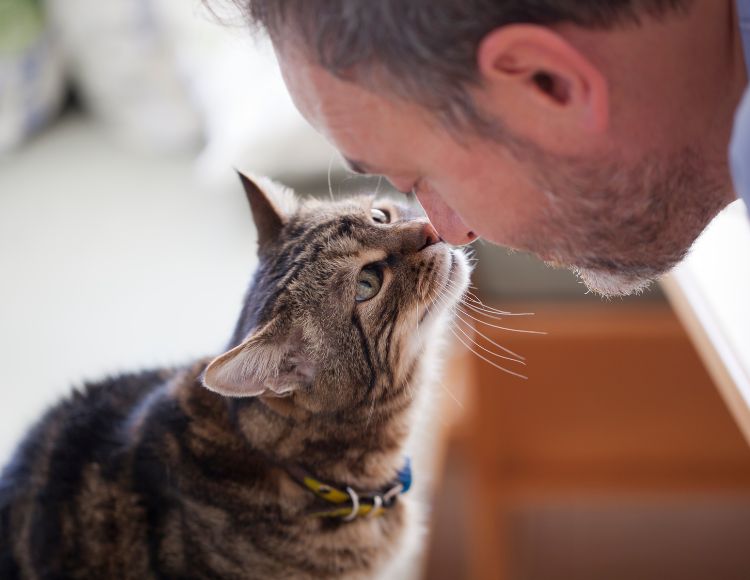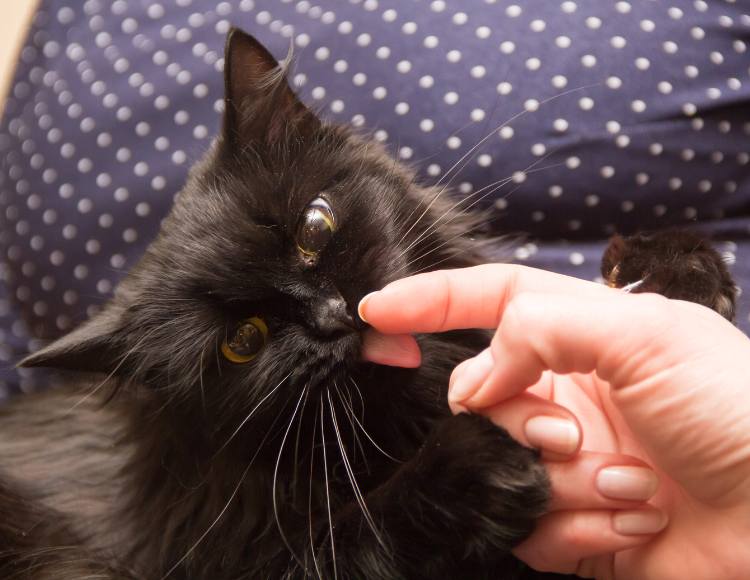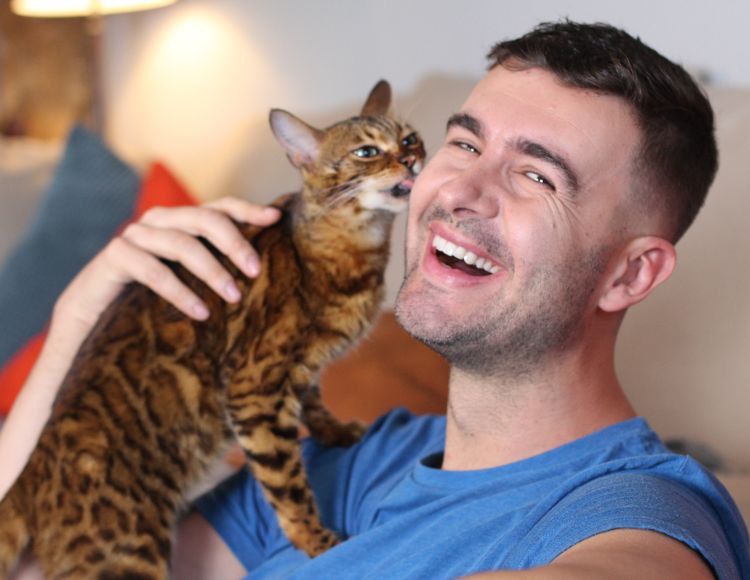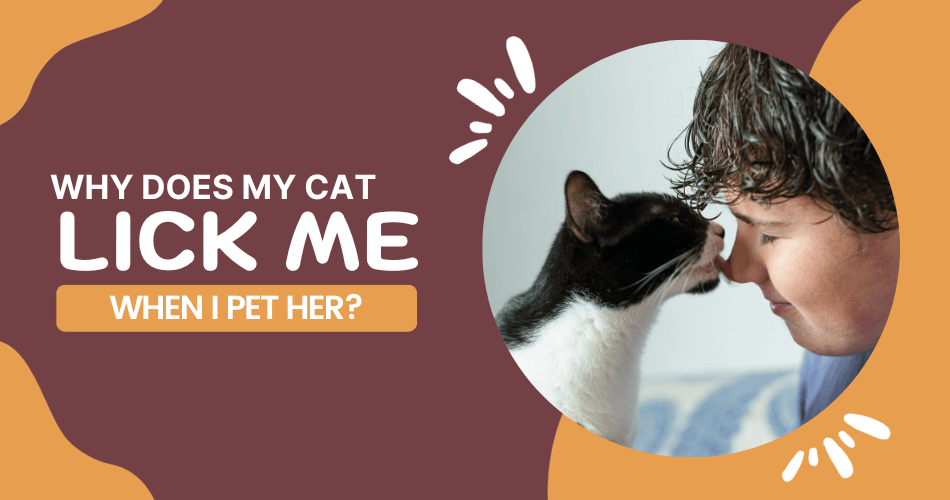While petting your cat on your lap, suddenly, you feel it is licking you, and you wonder why it does so?
Your cat licking you when you adore her is one of their cute behaviors. As a pet owner, you might have experienced this several times. And you might be curious what can be the possible reason behind this nature.
Though they do so to show love and affection, there are some more reasons like relieving stress, health check and so on. Sometimes, it is sweet but can be irritating and also may hurt.
Today, we will talk about this lovable pet: “Why does my cat lick me when I pet her?”. Also, discuss whether it is safe or not by seeing how to stop her.
What Does it Really Mean When Your Cat Licks You?
Cats are the most loving pets and are like a child for the pet owners. They are attention seekers, and whenever you pet them, licking your hand is their most common nature. And it is not worrisome most often.
When you pet your cat, it can feel the same love and bonding as grooming with other cats.
Cats use licking as a way to show their affection towards their owners and to form a stronger bond with them. Even the biggest cat breeds engage in this behavior, making it a common trait among felines. Their licking nature primarily stems from their desire to express their love and attachment towards their human companions.
Cats also use licking as a form of communication. If your cat licks you and then meows or purrs, it could be a way of expressing a desire for something, such as food, playtime, or affection.
The licking behavior may vary with the situation and nature. Not all cats lick humans.
So, licking you or itself is normal behavior. Your cat may be maintaining her hygiene as cats are cleaner than dogs. So, you really do not need to be worried about it. However, frequent licking can be a concern.
8 Reasons For Your Cat to Lick You
Though licking is a part of animal nature, cat parents always stay a bit more concerned about whether their cat’s behavior is normal or not..
Here are 8 possible reasons why your cat might lick you. So you know about their licking behavior well.
1. Cat Licks You as Family Bonding Expressing Familial Love and Care

Both humans and cats love each other’s interaction, getting familial love and care. We can pet them and talk to them to express our love. The same licking works as the love language of cats. When cats lay on your chest, it’s because they see you as part of their family.
Also, being naturally fastidious groomers, they may extend this behavior to their human companions by considering humans as their family members.
You may have witnessed your cats lick their kittens. This is the way of showing love to their felines. It is the same for humans, as they consider us as their family.
She can feel warmth and comfort when you pet her by scratching her back, chin, cheeks or ear. Then, she feels urged to show her emotions.
Another reason can be cats want to help you stay clean by licking your skin or hair. They do it to keep themselves and the kittens clean. They might do it for you as well.
2. Cat Licks You to Mark Territory Using Scent Glands to Label You As Her Own
Cats inherit the nature of marking their own territory. So, licking you may mean claiming ownership of you besides showing love. They do not like to share their love with others.
When they lick you, they actually transfer pheromones. They have scent glands in their saliva. This leaves their scent on the skin as a sign of marking territory.
This is like an invitation for you to become one of them. Licking you is a form of claiming you as their own. This is a kind of innocent behavior of cats.
3. Cat Licks You for the Taste on your skin

Cats have a potent scent receptor. They got attracted to various scents both through the nose and tongue. Sometimes, cats might lick you simply because they find your skin appealing.
For example, if you’ve recently applied lotion or perfume to your skin. Your cat might be attracted to it and lick you out of curiosity. Many times if she smells something good, tries to jump on you.
They also have a natural craving for salt and minerals, and your skin might taste salty to them due to sweat residue. Or if you have a fishy, meaty or other food smell on your hand. The chance is high for your cat to taste you.
So, next time your cat licks you, check out if there is any smell on your skin.
4. Cat Licks You to Relieve Stress Endorphins Released During Licking Offer Comfort
Licking can be a self-soothing behavior for cats. Your little kitten can get stressed for many reasons. Especially indoor cats because they grow up in a subtle environment.
However, if you see some behavioral change in your pet, like loss of appetite, not feeling energetic, or others, it means they are facing anxiety.
If they try to lick you in this phase, let them do it. Soon, they will be fine on their own.
When they lick themselves or their owners, it releases endorphins. This works like a stress-relieving effect. So, if your cat is feeling anxious or stressed, licking you may help them feel more at ease.
5. Cat Licks You to Grab Attention
Cats often miss their owner or crave attention and affection from their owners. Even though you are petting them, like scratching their back; but talk to others or not give full attention. Your cat will surely lick your hand.
Cats can observe and understand human behavior. So, licking their owner can be a way to get noticed.
If your cat licks you and then looks at you expectantly or meows. It indeed may be seeking more interaction and attention. They can do it if they are hungry, want to play, or need something else. They want to tell you what they need by grabbing attention.
6. Cat Licks You to Encourage Petting Signaling a Desire For More Affection
Have you ever wondered why your cat is clingy? This is because they always desire more affection and love. They want to spend quality time with their owners.
This is their altruistic behavior. Cats groom one another by licking. The mothers mostly do this to their kittens. So, since your cat is doing it for you, it may desire a stronger relationship.
Another reason can be a lack of love toward your pet for a long time. As a result, when your pet finally gets affection, they want more. Sometimes you may have seen cats try to lay on your chest when you pet her, all because of the desire for more love.
7. Cat Licks You in Reciprocation Trying to “Pet” You Back in Her Own Manner
Being perceptive animals, cats mimic the behavior of what they see. Sometimes, they may adopt behavior from other pets, such as ducklings. For example, if they see dogs are barking, cats may meow non-stop.
This is why they pet you back by licking you when you pet them. These innocent little creatures love us more than we can think. They also desire to pet or adore us back.
8. Cat Licks You Due to Health Concerns
Cats have a keen sense of smell and can detect changes in scent. They analyze your scent out of health concerns. Or we can say they perform a kind of “health check”.
While petting them, you stay too close to them, and they can notice the changes clearly.
Excessive licking from your cat can indicate a problem with your skin, such as allergies or a skin condition. Cats may lick irritated areas of your skin or have a different scent due to health issues.
Is It Safe To Let Your Cat Lick You?

Cats are known for their quirky behaviors, and one of the most common habits is licking their owners. Allowing your cat to lick you is generally safe and is often a sign of affection and bonding.
However, cat licking is totally safe. But for certain situations, you should consider some safety measures to ensure both your and your cat’s well-being.
Allergies: Some people may be allergic to proteins found in a cat’s saliva, urine, or dander. So, it is essential to know about the allergic problem.
After your cat licks you, if you feel any kind of irritation or discomfort, the reason can be allergy. Prolonged or frequent cat licking may exacerbate your allergy symptoms. In such cases, it’s better to limit the contact between your cat’s saliva and your skin.
Infections: Cats’ saliva has a lot of bacteria. So, if they lick any open wound, it can spread infection. Also, people with low immune systems tend to get infected by cats easily. To prevent these, keep your cat away.
Scratches and Bites: Licking is a gentle and affectionate behavior. You still need to be aware of your cat’s body language.
Sometimes, a cat may switch from licking to scratching or biting. It can happen if they become overstimulated or irritated. This can lead to scratches or minor injuries. Pay attention to your cat’s behavior and stop the interaction if it becomes too rough.
Zoonotic Diseases: There is a slight possibility of contracting zoonotic diseases from your cat. The risk is relatively low and zoonotic diseases can be ringworm or toxoplasmosis.
So, trying to maintain good personal hygiene and keeping your cat’s living area clean can help mitigate this kind of risk.
Cats Health Issue: No pet parents really want their cat to get sick anyhow. So, when you apply any lotion or chemical-based stuff on your skin, do not let your cat lick you. They may ingest these chemicals that may be harmful to them.
Do You Want to Stop Your Cat from Licking You?
Cat licking is not always comfortable and can hurt because of the tiny barbs they have in their tongue.
Cats’ tongues have hook-shaped barbs that are backwards-facing. This exactly functions like a comb. They lick themselves to clean and pull their fur. Licking can feel like rubbing sandpaper on your skin.
Moreover, some may stay busy and do not like cats licking interaction.
If you are experiencing anything like this, you now want to stop your cat from licking you.
How to Stop My Cat Licking Me?
Here are some techniques you can apply to stop your cat from licking you.
Use of Long-sleeve or Towel
You can cover your skin by wearing long-sleeve clothes. Or, while carrying cats on your lap, use a small, soft towel around your hand.
By doing this, your cat will not be able to reach your skin directly. It can work as a barrier and prevent licking or biting you.
Use of Interactive Toys
The most helpful technique can be using interactive toys. Whenever your cat tries to be with you, give them some pet toys so they forget about you for a while.
Cat toys are available in any pet shop, and you can easily buy them from there. Or you can customize some toys of your own.
You can even treat or entertain your cat. These can work as a good distraction.
Proper Training
Training them to stop licking can help in the long term. When they try to lick you, give them commands like “STOP” or “NO.” The training session requires a lot of patience because your cat will initially not understand.
What you can do is give immediate rewards or praise them when they stop. By doing this, they can understand what you are trying to say.
Cats Tree House
A cat tree house best helps to keep them busy. They can stay busy exploring the house. You can hide toys inside the tree and puzzle toys after a couple of days.
For this, buy a pet tree house and place it where your cat spends most of her time.
Lastly, do not scold them or treat them harshly. This can weaken your bonding. Try to understand your cat’s needs and why they are doing so. Then, take steps accordingly.
Verdict
Cats are way too adorable. They tend to do many things, such as licking their parents. As a pet parent, you might be concerned or curious about this behavior.
Initially, they do it to show love, affection or seeking attention. But there are many more reasons, including stress relieving, marking territory or health issues.
By now, you may know all the possible reasons why my cat licks me when you pet her. And there is nothing to worry about.
This habit is usual, and most of the time, it is safe. But licking can be hurtful or irritating sometimes. In this case, you can stop them by training them, giving them interacting toys, etc.
Whatever you do, do not forget your little friend loves you as much as you do. So, try to understand their needs first.

